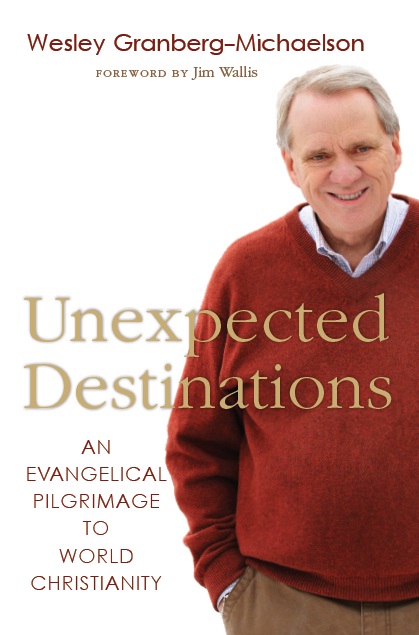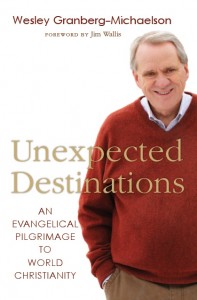Unexpected Destinations V: A Conversation with Wes Granberg-Michaelson
Read the first part of this interview
Read the second part of this interview
Read the third part of this interview
Read the fourth part of this interview
On our last conversation of the week, we conclude with conversation on the future of denominations and the ecumenical movement, and on the importance for those engaged in public ministry of attending to the inner journey.
CHR: Here’s a last question, on the future of denominations and the future of ecumenical work. As the denominations that are funding ecumenical work are in decline, international and national ecumenical movements are struggling to find adequate funding to continue. What do you see as the future of denominations and the future of the ecumenical movement?
WGM: George Anderson, the former presiding bishop of the ELCA, said when speaking to the General Synod of the RCA about the future of denominations, “Have you ever tried to close a single congregation?” These structures are going to be around and are going to continue. The question is not whether they will be around, the question is whether they will be any good or not. I’m fairly impatient with this discussion of whether there will be denominations. I think we need to talk about how denominations can be exhibiting God’s reign and participate in God’s mission. The way that denominational life plays itself out will be very different, but unless you get into a situation like China, where they have moved into post-denominationalism, it will be different but still identifiable. But in most of the situations we are in, the denominational structures might shift and the question will be whether they can be used not to draw lines and build walls and exclude and to build power, but can they take particular manifestations of the Body that over all enhances God’s mission in the world? Dick and I are working to how you really can envision denominations and their entities that are revitalized and renewed because of a clear sense of their missional purpose.
Now when you come to ecumenical work, I think the major ecumenical bodies are in a real absolute crisis. You see it is the NCC, the WCRC, the World Council, and it does partly reflect the issue of getting resources from partner denominations, but it also reflects that the organizations were put together in a way that organizations do not function in today’s culture. The CCT and GCF, which are trying to function in different ways and form relationships in different ways, they are giving hope. There’s no question that ecumenical relationships are going to be a crucial part of the future, but the organizations are going to have to change because the old organizations are not going to be able to do the job.
Dick Hamm (DH): The way you asked the question about denominations and denominationalism – denominationalism is a sin, so creating denominations because people are looking for the security of a brand, this is sinful and it is waning, in fact, through the ecumenical movement. Denominations can be a good thing, where you nurture a particular way of being church, they can generate accountability and they do things together that cannot be done separately. So if denominations go down they’ll be reinvented, because they are necessary, however onerous they have a tendency to become.
But if the Body of Christ is going to be one, we are going to have to continue to be in relationship with each other and remind ourselves that we are to be one. The real work of ecumenism is not to merge structures but to develop relationship and honest exchange and accountability. The crisis in ecumenism is not a crisis caused by ecumenism’s irrelevance; it is a crisis of organizational structures, most of which were created in the 1940s and 1950s. We need to reinvent the instrumentalities for a new day.
Adam Phillips (AP): I have spent the last three years working in an ecumenical and interfaith movement that advocates for the world’s poorest people. But I need my denomination; I am going to the midwinter conference soon of my denomination, and I need to go there and reconnect with those people, who care about me and support me and keep me going. I hate to use the word, but really it is like a family, or a tribe, that calls us in and cares for us, only to send us back out equipped to serve in the work of God’s mission the world. I need my denomination to be not only healthy but effective in my relationship with others.
WGM: I would add to that, if you step back and think about it from a biblical frame, to describe a church as an independent, Bible-believing church, as my church did as I grew up, it’s just an oxymoron. There is no church in the New Testament that reflects that image. The churches in the New Testament reflect relationship and accountability and support. Christianity is personal but not individualistic. You can’t conceive of Christianity without community.
So, regardless of how you want to think about structures, you come back to some fundamental questions. First, the work of God and God’s mission and our life together – we do this better together than we do it apart from one another and structures have to help us with that. Secondly, we have to be accountable to more than just ourselves, to more than just our congregation, to more than just our denomination. And those kinds of needs are going to drive you back to structures that do what denominations do and some structures that engage us ecumenically. The shape and form may change but the function is so necessary to what it means to be the church that they are going to endure.
CHR: Final thoughts?
WGM: I think this has been marvelous, and I have really enjoyed it. It has helped me to listen to Dick and Adam. If there’s any one thing that I hoped people would reflect on, it would be the priority of figuring out, in our journeys, have to do this really difficult work of figuring out how to give space and nurture and time to one’s inner life as a means to enabling one’s outer calling and to deal with the inevitable tensions and anxieties that come with ministry. That’s why the quote from Nouwen is so crucial.
If anyone is drawn to the justice part of the Gospel, which for me is what the gospel is about, it is so important that we give attention to the inner journey, or else the communities we are part of will not be able to stay with it for the long haul.
AP: That was the most important part of the book for me, to read of a life lived in public with deep inner roots. It was really important to think about ministry not as climbing ladders but as following God’s call on my life. That really resonated with me.
DH: I am 64, and toward the end of my professional journey, and people have experienced me as the roles I have played – as a pastor, and as a regional executive, and as a head of denomination, and as a consultant. In none of these do people actually get to know who you really are but see you through the ministry role you have. The thing I loved about the book is that Wes has done all that too, he has his own set of roles, but this gave him a chance to talk about how faith has touched his life and Christ and the Spirit, and how Christ and the Spirit continue to touch his life. I found myself needing to say, “I know you needed me to be in this role or that role, and I tried my best to be in that role in the best possible way, but you didn’t actually get to know a tenth of me, and now I want to share the kind of struggles I have gone through and my personal struggles and joys with the Spirit of Christ. I think I’m going to have to write a similar book, and it probably won’t publish because it won’t be as good, but it will help me tell me own story in ways that will help me integrate it more than I have. I want to say to people, “read this book and you’ll know more about me.” Not that I am identical to Wes, but we have similar journeys, and in fact we all have similar journeys, where we surrender, and we resurrender and we resurrender, and we struggle to examine and be led by the Spirit. This is a side of the faith that people really need to hear more than they need the public role. Thanks, Wes, for being so visible – this is kind of a visible man book, a visible Christian book. Thanks so much.
CHR: Thanks everyone for a rich conversation, and thanks, Wes, for writing a thought-provoking book!



Pingback: christianoutreachnow.com - Unexpected Destinations V: A Conversation with Wes Granberg …